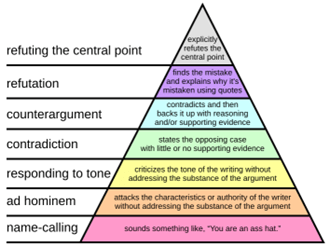[Feedback welcome please]
In the ideal, explicitly ask the following to the interlocutor and/or yourself:
1. Non-Taste
“Is this just a matter of taste?”
2. Open-mindedness #1
“Are you willing to change your mind?”
//Their response — particularly the degree of identity protection/tribalism — determines whether you speak to persuade them, to persuade any audience, or whether to abandon the conversation entirely.
3. Utility
“What are each of our purposes for this discussion — persuading who? Is this for self-assurance?”
“Is this worth my time?”
// Don’t get addicted
4. Behavioural Incentives
“Is there a social context present for one to change their minds?”
“Will they behave?” eg airtime, interruptions, rhetoric, comprehension efforts etc
//Police the use of these power/dominance techniques
//Police the use of logic
“Do I have an existing/possible relationship with this person?”
“Should we discuss this in private?”
“Should we discuss this in-person or in voice?”
// Communicate as if face-to-face regardless
5. Open-mindedness #2
// Visualise being wrong / ‘Consider the opposite’
// Humanise; they are at worst mistaken, not evil; Starmanning
// Ataraxia and anti-tribalism/anti-identity; emotion obscures confusion
6. Comprehension
“What do you mean by X?”
“Can you elaborate?”
“Can we think of examples?”
“Can we think of analogies?”
“I understand you to be saying XYZ, is that correct?” (Get confirmation)
“What, in your words, is my position?”
7. Other-siding
“What are the arguments against this position?”
// Seek opposition / ‘Hear the other side’
// Other-siding: the ability to accurately characterise the other side
// In advance, check that you pass as a true believer with actual true believers (Ideological Turing Test + Validation)
8. Justification
“Why is that?”
“What principles underlie this position?”
// Decouple
“Can we think of counterexamples?”
“Is there a citation that we both respect?”
“Let’s flag that to provide a citation later”
“Why do you think we disagree?”
// Double-Crux
// Examine assumptions; what is unspoken?
9. Open-mindedness #3
“How confident are you in that from 1–10?”
“What could count as evidence against that position?”
“Can you think of anything in particular that would change your mind?”
#===#
Graham’s Hierarchy of Disagreement values quotation and logic, but it ignores that refuting testimony may be impossible in short time-frames, that identifying common ethical values do depend on one’s character, and it ignores the importance of communication such as checking for comprehension.
From https://kungfuhobbit.medium.com/disagreement-and-inquiry-e26a6b2e8f23#ef33




Regarding 2: It can still be worth talking with someone who isn't willing to change their mind. For example, I know nothing about physics, so I wouldn't expect a physicist to seriously entertain the speculations that I have about the subject. But I think that I could learn a great deal about physics by talking to a physicist, so it makes the conversation worthwhile.
Also, in certain contexts, it can sound somewhat rude to ask someone if they are willing to change their mind. It can implicitly suggest that you think the other person is closed-minded, so it doesn't make sense to ask it explicitly. (Likewise, I think of each of the questions in your post are useful rhetorical tools in the right context, but they don't all need to be asked explicitly, even in an ideal conversation.) . An analogy: If you ask, "Did you smoke anything when you came up with that thought?" it implies that you have a low opinion of their intelligence.
Regarding 5: It seems false to say other people are never evil. Sometimes people do genuinely hold different values from us. And if they got what they wanted, it would be a significant set back to our own values. Eg. Some people place no weight on the welfare of humans in other countries or non-human animals.